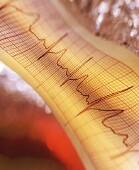
THURSDAY, May 13 (HealthDay News) — By treating the common irregular heartbeat known as atrial fibrillation in a certain way, doctors might also help prevent Alzheimer’s disease and other forms of dementia, new research finds.
In atrial fibrillation, the upper chambers of the heart beat chaotically, causing blood to pool and increasing the potential of clots, stroke, heart failure and death.
Recent research has shown that atrial fibrillation more than doubles the risk of Alzheimer’s, especially in relatively younger patients, noted Dr. John D. Day, lead author of two new studies and a cardiologist and electrophysiologist, or heart rhythm specialist, at the Heart Institute at Intermountain Medical Center in Salt Lake City.
That makes the results of the new study “very exciting,” he said. “If we can eliminate atrial fibrillation, we can potentially help to reduce the risk of premature death, stroke, dementia and Alzheimer’s disease from atrial fibrillation.”
In the study, Day and his team followed about 4,200 patients with a mean age of 65 who were treated with catheter ablation to ease their atrial fibrillation.
In this procedure, a catheter is threaded through a vein in the legs. The abnormal tissue is then cauterized, which cures atrial fibrillation in many people, experts said.
The health of those treated in this way was compared to about 16,800 patents matched by age and gender whose atrial fibrillation had been treated with medications, and about the same number of patients matched by age and gender who did not have the irregular heartbeat.
About 0.2 percent of patients who underwent catheter ablation developed Alzheimer’s disease, compared to 0.9 percent of those with atrial fibrillation that was treated with medications.
About 0.4 percent treated with ablation developed other forms of dementia, compared to 1.9 percent treated by medications.
Though the percentages are small, millions of people have atrial fibrillation, so the difference could mean avoiding thousands of cases of dementia, Day said.
Patients who had catheter ablation also had a lower risk of stroke and death. About 2.2 percent who had ablation had a stroke compared to 4.7 percent of those treated with medication. About 6 percent of patients ablation patients died, compared to 23.5 percent treated by medications.
“The risk of dying, the risk of stroke, the risk of dementia and Alzheimer’s disease were all significantly reduced in the patients who underwent an ablation procedure than those treated with medications — so much so that the long term risk was as if they did not have atrial fibrillation at all,” Day said.
The findings were to be presented May 13 at Heart Rhythm 2010, the Heart Rhythm Society’s annual scientific meeting, in Denver.
Dr. Richard L. Page, president of the Heart Rhythm Society and chair of the department of medicine at University of Wisconsin School of Medicine in Madison, said the reasons for the link between Alzheimer’s and atrial fibrillation are still not well understood. While the study is important, only a randomized clinical trial could prove definitively that ablation helps ward off dementia.
It’s possible people who did not get ablation were already weaker or had some subtle signs of dementia to begin with that made doctors, patients and their families opt against the treatment, Page said.
“We can’t conclude that the ablations reduced the risk of those outcomes, but it raises the possibility,” he said.
After ablation, about 64 percent of people with atrial fibrillation no longer had the arrhythmia or needed to take medications for arrhythmia at the end of the three years, the team found.
Symptoms of atrial fibrillation can include rapid and irregular heartbeat, palpitations, shortness of breath or fatigue and chest discomfort. Atrial fibrillation sharply increases risk of stroke, heart failure, dementia and premature death, experts said.
About one in 20 people over age 65 has it, while one in 10 ages 80 to 85 have it, Page said.
At last year’s meeting, Day’s team presented research showing that people with atrial fibrillation were 44 percent more likely to be diagnosed with Alzheimer’s disease over a five-year period than those without the heart disorder. The association was especially strong for people under the age of 70. Those with atrial fibrillation were 130 percent more likely to develop Alzheimer’s disease.
“If you have both atrial fibrillation and Alzheimer’s disease, the Alzheimer’s disease seems to be very aggressive,” Day added.
More information
The American Heart Association has more on atrial fibrillation.

